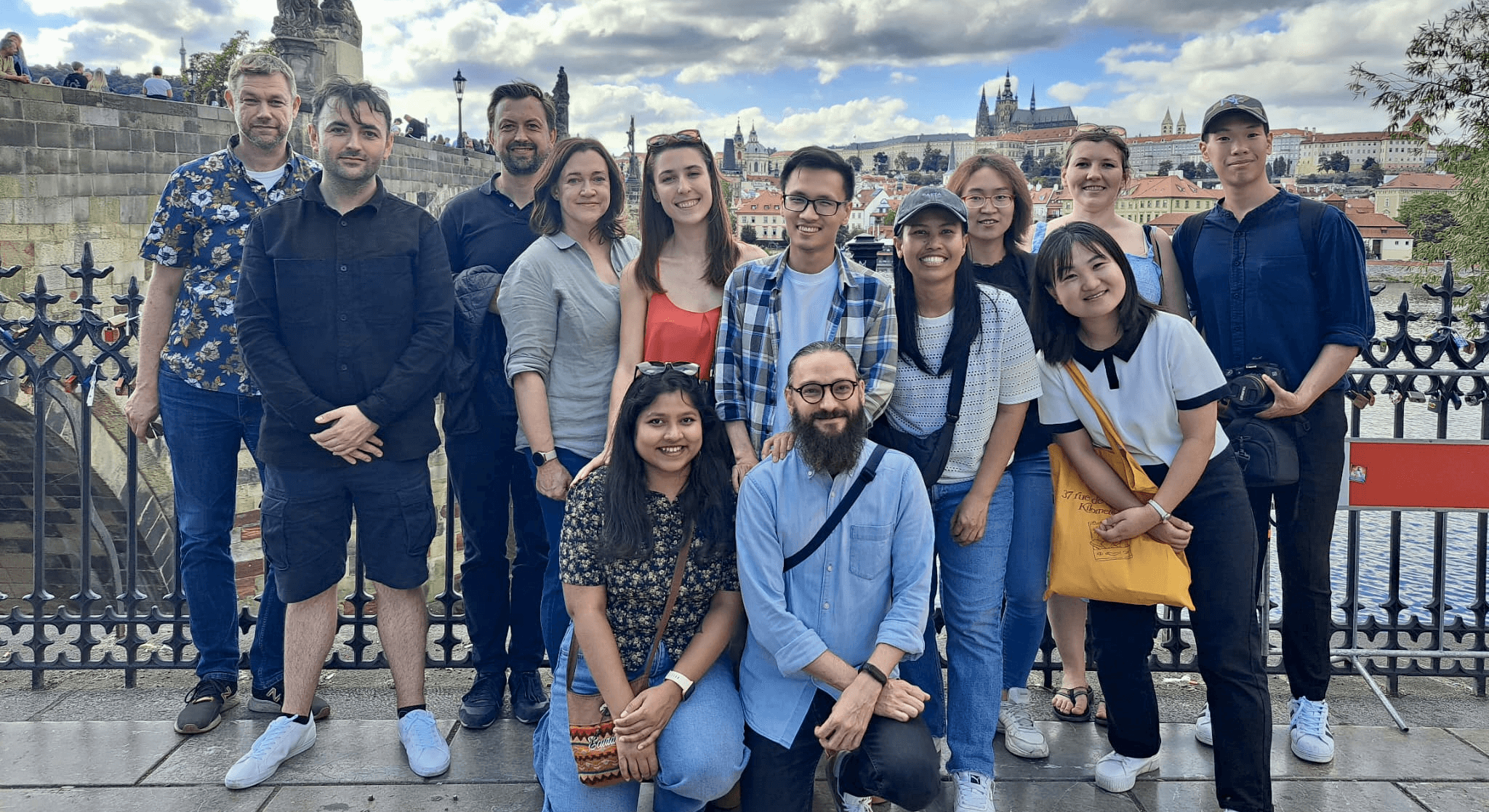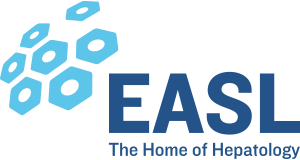Andersen Group
The goal of the laboratory is to unravel the biological mechanisms leading to primary liver and biliary tract cancers and thus, understand the molecular pathogenesis. Our ambition is to translate solutions to the clinic for improved patient outcome.
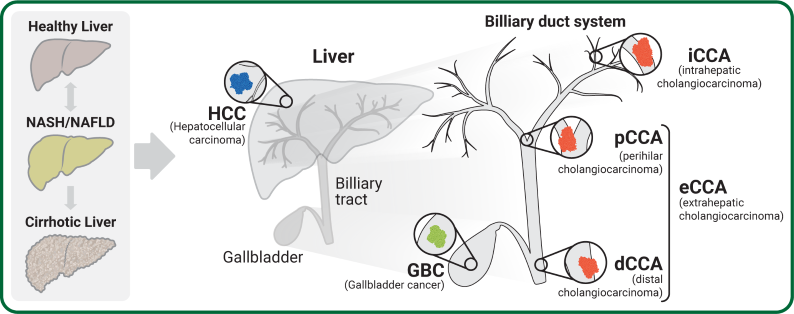
We focus mainly on omics-driven solutions to unravel perturbed mechanisms required for the tumor to develop, to grow and to metastasize. Primary liver cancers (PLC) often evade diagnosis until late-stage in the disease where the tumor is locally advanced or metastatic. We utilize genome-wide approaches in patient characterization and stratification, diagnostic and prognostic biomarkers to facilitate precision therapy.
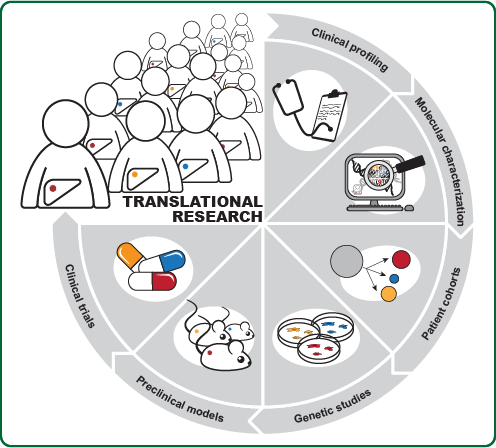
1. Fibroblast-Derived Lysyl Oxidase Increases Oxidative Phosphorylation and Stemness in Cholangiocarcinoma. Lewinska M et al. Gastroenterology. 2023 Dec 13:S0016-5085(23)05594-4. doi: 10.1053/j.gastro.2023.11.302. PMID: 38096955
Highlights:
In this study, we show that fibroblast-derived lysyl oxidase (LOX) enters cancer cells and reshapes the cholangiocarcinoma (CCA) metabolism by protein–protein interaction with the mitochondrial transcription factor A. LOX is internalized by CCA tumor cells. This supports tumor initiation and progression in vitro and in vivo by improving metabolic fitness, modulating the mitochondrial function, and increasing stemness. Inhibition of LOX activity in a murine model of CCA leads to diminished tumor burden.
Basic research: LOX alters CCA transcriptional programs by means of protein–protein interaction with transcriptional factors and the cytoskeleton.
Clinical impact: High LOX levels are associated with diminished survival. Modulation of LOX activity in patients with primary sclerosis cholangitis and CCA can present novel preventative and therapeutic strategies.
2. Molecular portraits of patients with intrahepatic cholangiocarcinoma who diverge as rapid progressors or long survivors on chemotherapy. O’Rourke CJ and Salati M et al. Gut. 2023 Sep 27:gutjnl-2023-330748. doi: 10.1136/gutjnl-2023-330748.
Highlights:
Pre-treatment transcriptomic profiles of diagnostic biopsies differentiate intrahepatic cholangiocarcinoma (iCCA) patients who become rapid progressors or long survivors on chemotherapy.
- Blunted innate immune response is a defining hallmark of rapid progressor tumors.
- The RPLS signature is predictive and prognostic in iCCA, but not extrahepatic CCA.
- The RPLS signature predicts chemotherapy outcome in liver-metastatic colorectal cancer when evaluated in the liver lesion, but not the primary tumour.
3. Alternative promoters in CpG depleted regions are prevalently associated with epigenetic misregulation of liver cancer transcriptomes. Nepal C et al.. Nat Commun. 2023 May 11;14(1):2712. doi: 10.1038/s41467-023-38272-4. PMID: 37169774
Highlights:
- We demonstrate that most downregulated genes in a tumor are multi-promoter (MP) genes, while upregulated genes in cancer are single-promoter (SP) genes. Down-regulation of MP genes is due to transcriptional interference caused by alternative promoters.
- We show that alternative promoters are depleted for CpG islands (CGIs). The depletion of CGIs is even more dramatic in tumor-specific novel alternative promoters. We thus demonstrate that MP genes encode CG-rich promoter as reference and CG-poor promoters as alternative. Unlike embryonic cells, tumor cells specifically avoid transcription from intragenic CGIs. Thus, we show that two distinct mechanisms (CG-rich and CG-poor promoters) of promoter regulation co-exist in the same genes as MP genes.
4. Serum lipidome unravels a diagnostic potential in bile acid diarrhoea. Lewinska M et al. Gut. 2023 Apr 18:gutjnl-2022-329213. doi: 10.1136/gutjnl-2022-329213. Online ahead of print. PMID: 37072179
Highlights:
- This is the first study presenting a comprehensive serum lipidomic and metabolomic landscape of bile acid diarrhoea (BAD) patients at the time of diagnosis. Significant alterations in metabolomic profiles allowed the development of a serum-based diagnostic model and prediction of treatment response.
- The new diagnostic model based on a single serum sample may improve and accelerate the diagnostic process and, thus, increase treatment accessibility. Also, the serum-based prediction of treatment response may spur improved individualization of BAD treatment.
5. MicroRNA-27a-3p targets FoxO signalling to induce tumour-like phenotypes in bile duct cells. Duwe L et al. J Hepatol. 2023 Feb;78(2):364-375. doi: 10.1016/j.jhep.2022.10.012. Epub 2022 Oct 28. PMID: 36848245
Highlights:
- CCA tissues are characterized by extensive microRNA (miR) upregulation, increased miR biogenesis pathway expression and miR heterogeneity compared to surrounding liver tissues.
- A majority of miRs upregulated in CCA tissues result in increased proliferation when introduced into 3 normal human cholangiocyte models in vitro.
- MiR-27a-3p affects FoxO signalling in CCA patients in vitro and in vivo.
- CRISPR/Cas9 nickase knockout of miR-27a abrogates tumorigenicity in vitro and in vivo.
6. Whole blood microRNAs capture systemic reprogramming and have diagnostic potential in patients with biliary tract cancer
Høgdall D, O'Rourke CJ, Larsen FO, Zarforoushan S, Christensen TD, Ghazal A, Boisen MK, Muñoz-Garrido P, Johansen JS, Andersen JB. J Hepatol. 2022 Oct;77(4):1047-1058. doi: 10.1016/j.jhep.2022.05.036. Epub 2022 Jun 21. PMID: 35750139. Whole blood microRNAs capture systemic reprogramming and have diagnostic potential in patients with biliary tract cancer.
Whole blood miRNA profiles are altered in patients with biliary tract cancers (BTC). We have defined an index of miRNAs that in combination with serum CA 19-9 has the potential to improve early diagnosis of BTC. This diagnostic panel is pending further validation.
- Whole blood miRNA profiles are altered in patients with BTC irrespective of tumor location or clinical setting.
- Quantification of 4 whole blood miRNAs captures diagnostic information independent of CA 19-9.
- Candidate diagnostic miRNAs are implicated in tumor immunity.
7. NAFLD-HCC
Lewinska M et al. EBioMedicine, 2021. The altered serum lipidome and its diagnostic potential for Non-Alcoholic Fatty Liver (NAFL)-associated hepatocellular carcinoma.
Non-alcoholic fatty liver disease (NAFLD) is a group of metabolic disorders that can progress to hepatocellular carcinoma (HCC) often without a background of cirrhosis. NAFLD is known to affect 24% of the global population. Liver cancers, developing in the background of NAFLD is on the rise. In this study, we show:
- The first comprehensive serum lipidomics investigating a broad-range of lipid classes in NAFLD and NAFLD-HCC
- Evidence of lipidomics in detection of NAFLD-HCC. We have developed a NAFLD-HCC Diagnostic Score (NHDS) as a putative screening tool for HCC development in a metabolic liver background
- How fatty acid (FA) uptake is increased in NAFLD-HCC tumors, which result in FA depletion in the blood circulation of NAFLD-HCC patients
8. Integrative molecular characterization of gallbladder cancer (GBC) reveals microenvironment-associated subtypes
Nepal, Zhu & O’Rourke et al. Journal of Hepatology, 2020. Integrative molecular characterization of gallbladder cancer (GBC) reveals microenvironment-associated subtypes
Gallbladder cancer is highly fatal, and its causes are poorly understood.
- We found evidence of aflatoxin exposure in GBC based on an aflatoxin-related genetic signature. Aflatoxins are a family of toxins produced by certain fungi that grow on agricultural crops such as corn and peanuts. Out of 92 patients with GBC, 39 (42%) had the aflatoxin-related signature, and these mutations tended to be clonal present in more than 50% of the cancer cells, suggesting that aflatoxin exposure resulted in early molecular changes.
- Immune cells surrounding the tumors (tumor microenvironment) were associated with survival
9. BTC: Serum IL-6 as a prognostic biomarker and therapeutic target
Hogdall et al. Clinical Cancer Research, 2020. Serum IL-6 as a prognostic biomarker and IL-6R as a therapeutic target in biliary tract cancers
Biliary tract cancer (BTC) patients typically survive less than one year on standard-of-care chemotherapy. Adapting prognostic biomarkers to guide BTC patient management remains challenging. In this study, we measured serum IL-6, YKL-40, and CA19-9 before and during chemotherapy in 452 advanced BTC patients.
- While all markers provided variable prognostic information prior to treatment, longitudinal analysis of IL-6 was superior in predicting death during treatment.
- Blocking IL-6 (IL-6 receptor) signalling with tocilizumab significantly increased response to gemcitabine in a mouse model of human BTC.
- Thus, the IL-6 axis may be prognostically informative and therapeutically attractive in this rare patient demographic.
Technology in our laboratory spans broadly genomic and epigenomic characterization, functional high-throughput screens to elucidate disease-relevant genes and drug resistant mechanisms as well as disease-modelling in primary cultures and mice over diagnostic or metabolic rearrangement in the early onset of liver disease.
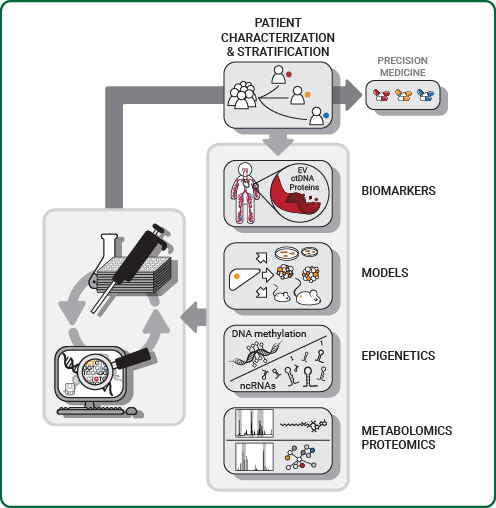
Inflammatory niche controlled by IL6 promotes liver cancers. As cancer therapies advance, the duration and diversity of treatments are increasing per patient, extending the impact of systemic inflammation and requiring inflammation-directed therapies to impede treatment resistance and mitigate toxicities. In 410 Danish biliary tract cancer (BTC) patients, we have recently shown that serum levels of the cytokine, interleukin-6 (IL6), prior to and particularly during chemotherapy are associated with poor prognosis (read more about serum IL6 as a prognostic biomarker). Therefore, chronic IL6 signaling may result in de novo tumor behavior and therapeutic sensitivities, characterization of which can be exploited to develop new predictive biomarkers and drug combinations to target cancer-promoting inflammation and increase survival of cancer patients.
Understanding the molecular pathogenesis of hepatobiliary cancers. Despite tantalizing clues as to the importance of genetics in hepatobiliary carcinogenesis, little is known about the genetic underpinnings of these malignancies. In this program, our primary goal is to characterize the molecular alterations important in intrahepatic and extrahepatic bile duct cancers, leveraging a multi-omics approach to emphasize patient subset for precision therapy.
Characterizing the deregulated epigenomic control in metastasis and guiding treatment. Epigenetic alterations ‘epimutations’ comprise alternative genomic perturbation mechanisms, the dynamic nature of which may present rapid tumor diversification during disease progression. We know primary liver cancers are highly polarized at the epigenomic level both in the primary and metastatic stages of the disease. This suggests a fundamental difference in their molecular pathogenesis, which may be exploited therapeutically (epi-therapy).
Understanding the early metabolic rearrangements in the liver. The endemic increase in obesity promotes Non-Alcoholic Fatty Liver Disease (NAFLD) and Steatohepatitis (NASH), which affect up to 40% of the European population. The liver is a key organ in controlling metabolic homeostasis, and rearrangements in these processes are known to cause HCC. However, the exact alterations causing metabolic disease to progress to HCC remain elusive. Manipulation of central genes controlling the metabolic imbalance will allow us to understand the biology and consequence in HCC progression. This knowledge is crucial to improve diagnosis, patient stratification and design novel treatment options.
Utilizing non-coding RNAs in biomarker discovery and drug resistance. To elucidate the role of ncRNAs in diagnosis, prognosis and in controlling treatment resistant mechanisms.
News from Andersen group
July 2024:
Assistant professor Colm O’Rourke to speak at the joint Precision-BTC COST Action and European Network for the Study of Cholangiocarcinoma in Krakow, Poland. “Identifying the Correct Candidates: Can molecular biology help?”
Jesper B Andersen presents the “European Molecular Registry of Cholangiocarcinoma. An update” at the joint Precision-BTC COST Action and European Network for the Study of Cholangiocarcinoma in Krakow, Poland.
June 2024:
MD PhD student Trung D. Nguyen wins first prize for his poster presentation at the 2024 MOMED PhD Summer School, University of Copenhagen.
April 2024
Prof. Andersen to participate at the EU-Life symposia on artificial intelligence (AI) in biology in Vienna, Austria.
March 2024
Assistant Prof. Colm J O’Rourke to join the European Association for the Study of the LIver Molecular Tumour Board (EASL-MTB) discussing applications of Target Enrichment Sequencing (TES) results and allocation of treatment of cholangiocarcinoma.
Ms. Bichitra Paul to defend her PhD entitled “Differential dependence on lipids and serine in hepatocellular carcinoma” on March 15th. Her assessment committee is Prof. Filip Krag Knop, DK (Chairperson), Prof. Maja Sofie Thiele, DK and Prof. Philipp Kaldis, SE. PhD
January 2024
Postdoc Dan Høgdall, MD PhD to initiate a national protocol on small bowel adenocarcinoma in Denmark.
The Andersen group together with Center for Clinical and Metabolic Research at Herlev and Gentofte hospital to initiate the DIVA trial: Evaluation of the Bile acid Diarrhea Score (BDS) on serum metabolic changes developed in Lewinska, Kårhus et al., Gut 2023 versus the current standard radioactive test 75SeHCAT for bile acid diarrhea.
Prof. Jesper B Andersen to give his inauguration talk. https://uniavisen.dk/en/event/10-years-of-primary-liver-cancer-inaugural-lecture-by-prof-jesper-b-andersen/
December 2023
New paper by Assistant Professor Monika Lewinska in Gastroenterology. Fibroblast-Derived Lysyl Oxidase Increases Oxidative Phosphorylation and Stemness in Cholangiocarcinoma. Lewinska M et al. Gastroenterology. 2023 Dec 13:S0016-5085(23)05594-4. doi: 10.1053/j.gastro.2023.11.302. PMID: 38096955
November 2023
The European Union COST Action (CA22125) “Precision Medicine in Bile Duct Cancers” – Prof. Jesper B Andersen elected chairperson of the cross sectional working group 5 on artificial intelligence. Visit website here.
New paper by PhD student Virag Gehl in Hepatology. Immunogenomics of cholangiocarcinoma. Gehl et al. Hepatology. 2023 Nov 16. doi: 10.1097/HEP.0000000000000688. Online ahead of print. PMID: 37972940
October 2023
New paper by Assistant Professor Colm J O’Rourke in GUT: Molecular portraits of patients with intrahepatic cholangiocarcinoma who diverge as rapid progressors or long survivors on chemotherapy.
O’Rourke CJ and Salati M et al. Gut. 2023 Sep 27:gutjnl-2023-330748. doi: 10.1136/gutjnl-2023-330748. Fantastic collaboration with Prof. Chiara Braconi University of Glasgow, UK and many others.
Best wishes for the future: Assistant Professor Monika Lewinska is leaving the group to join the Danish biotech company GUBRA as scientist in the Molecular Pharmacology & Assay team.
September 2023
Congratulation: Postdoctoral fellow Dr. Supaporn Yangngam, who received an independent postdoctoral fellowship from the Danish Cancer Society
Jesper B Andersen to speak about blood-based surveillance in liver cancers at the International Liver Cancer Association Congress in Amsterdam, Holland.
Jesper B Andersen to speak at the joint University of Copenhagen-Korean Advanced Institute of Science and Technology in Deajeon, S. Korea.
August 2023
Jesper B Andersen to speak at the first FASEB conference focused on cholangiocarcinoma: Molecular Drivers, Microenvironment and Precision Medicine in Palm Springs, USA
June 2023
PhD student Bichitra Paul receives a generous travel grant from the Danish Cancer Society to present her study on lipid regulation in HCC at the International Liver Cancer Association annual conference in Milan, Spain.
PhD student Marvelmario Reginald Gabriel receives generous research grant from the Danish Cancer Research Foundation (Dansk Kræftforskningsfond) for his proposal “Tumor-macrophage dynamics and chemoresistance mechanisms in bile duct cancer”
Monika Lewinska to host and teach the workshop “hands on omics: applications of genomics in liver research” at the European Association for the Study of the Liver, International Liver Congress in Vienna, Austria
Jesper B Andersen to speak about biomarkers at the Research Think Tank session during the European Association for the Study of the Liver, International Liver Congress in Vienna, Austria
- Chairing the session on liver tumors (basic research)
- Hosting the workshop “Hands on omics: applications of genomics in liver research”
- Charing the session “meet the European Network for the Study of Cholangiocarcinoma (ENSCCA)”
Jesper B Andersen to give the opening keynote at the Japanese Society of Hepatology in Nara, Japan
Jesper B Andersen to speak at the Euro-CholangioNet COST action (CA18122) meeting in Rome, Italy. Chair of WG3 on the molecular registry of cholangiocarcinoma
May 2023
The ENSCCA network receives collaborative network grant from the European Union COST Action (CA22125) to funding our work the next 4 years. The network “Precision Medicine in Bile Duct Cancers” will relieve the EuroCholangioNET.
New paper by Chirag Nepal in Nature Communications: Alternative promoters in CpG depleted regions are prevalently associated with epigenetic misregulation of liver cancer transcriptomes. Nepal C, Andersen JB. Nat Commun. 2023 May 11;14(1):2712. doi: 10.1038/s41467-023-38272-4. PMID: 37169774
Jesper B Andersen to speak at the UK Cholangiocarcinoma Charity conference (AMMF2023) in Stansted, UK. https://ammf.org.uk/wp-content/uploads/2023/04/AMMF-Conference-Programme-2023-11.4.23.pdf
April 2023
New paper by Monika Lewinska in GUT: Serum lipidome unravels a diagnostic potential in bile acid diarrhoea. Lewinska M, Kårhus ML, Ellegaard AG, Romero-Gómez M, Macias RIR, Andersen JB, Knop FK. Gut. 2023 Apr 18:gutjnl-2022-329213. doi: 10.1136/gutjnl-2022-329213. Online ahead of print. PMID: 37072179
Collaboration between the Andersen group and Prof. Filip K. Knop at the Center for Clinical Metabolic Research, Herlev and Gentofte Hospital.
Jesper B Andersen to speak at the Liver Cancer Summit in Portugal. Title: Tumor microenvironment in cholangiocarcinoma.
Juan Francisco Lafuente Barquero presenting his study at the Liver Cancer Summit in Portugal. “Epigenetic essentialities in cholangiocarcinoma”.
Colm J. O’Rourke to speak at the Cholangiocarcinoma Congress (CCF2023) in Salt Lake City, USA.
February 2023
Marvelmario Reginald Gabriel, MSc. to join the Andersen group as PhD student in the MSCA COFUND program (DISCOVER).
Trung Dinh Nguyen, MD to join the Andersen group as PhD student in the MSCA COFUND program (EMERALD).
Supaporn Yangngam, PhD to join the Andersen group as postdoctoral fellow.
Jesper B Andersen to give the Blenkinsopp Memorial keynote lecture at the British Association for the Study of the Liver CCA-UK annual meeting at University of Nottingham
Jesper B Andersen to speak at the Asian Pacific Association for the Study of the Liver (APASL 2023) in Taipei, Taiwan. Application of AI and Big Data in Hepatology
ENSCCA consortium publishes a paper on the criteria for preclinical models in cholangiocarcinoma in Nature Reviews Gastroenterology and Hepatology: Criteria for preclinical models of cholangiocarcinoma: scientific and medical relevance
January 2023
Jesper B Andersen to speak at University of Florence, Department of Experimental and Clinical Medicine.
December 2022
Assistant professor Monika Lewinska receives funding from the “University of Copenhagen Cancer Research Fund” and “Læge Sofus Emil Friis og Hustru Olga Doris Friis’ legat” for spatial metabolomics.
October 2022
New paper by Dan Høgdall in Journal of Hepatology: Whole blood microRNAs capture systemic reprogramming and have diagnostic potential in patients with biliary tract cancer.
New paper by iMED PhD student Lea Duwe in Journal of Hepatology: MicroRNA-27a-3p targets FoxO signalling to induce tumour-like phenotypes in bile duct cells
September 2022
New paper by PhD Student Lea Duwe in Translational Oncology: Unraveling the actin cytoskeleton in the malignant transformation of cholangiocyte biology.
PhD student Lea Duwe receives a travel grant from the Danish Cancer Society for oral presentation at the International Liver Cancer Association Annual Conference 2022 in Madrid, Spain.
Andersen group receives funding from the AMMF UK Cholangiocarcinoma Charity
August 2022
Jesper B Andersen to speak at APPLE 2022: The 12th Asia-Pacific Primary Liver Cancer Expert Meeting, Shanghai PR China. Title: Mutational Signatures and Processes in Hepatobiliary Cancer
Jesper B Andersen to speak at the 1st Africa HepatoPancreatoBiliary Cancer Consortium in Cairo, Egypt
July 2022
Colm J. O’Rourke to speak at the bi-annual ENSCCA conference in Edinburgh, UK. Title: Transcriptomics implicates tumour genotype-immunophenotypic dynamics with chemotherapeutic benefit in patients with intrahepatic cholangiocarcinoma.
Monika Lewinska to speak at the bi-annual ENSCCA conference in Edinburgh, UK. Title: Transcriptomics implicates tumour genotype-immunophenotypic dynamics with chemotherapeutic benefit in patients with intrahepatic cholangiocarcinoma.
Jesper B Andersen to speak at the bi-annual ENSCCA conference in Edinburgh, UK. Title: Functional targeting of genetic alteration in cholangiocarcinoma.
June 2022
iMED PhD student Ms. Virag Gehl has received a research grant from the Danish Cancer Research Foundation (Dansk Kræftforskningsfond) for her proposal “Impact of IL-6 activation on tumour behaviour and therapeutic sensitivities in bile duct cancer”.
Assistant Professor Chirag Nepal starting his independent position as a tenure-track group leader in Bioinformatics (RNA biology) at Loma Linda University, School of Medicine, Center for Genomics in LA, USA.
The Euro-CholangioNet COST Action CA18122 to host a summer school in “Multi-omics in Cholangiocarcinoma” Krakow, Poland. Teachers (Andersen group): Monika Lewinska, Colm J. O’Rourke, and Jesper B Andersen
Jesper B Andersen to host a research think-tank on Highlighting novel targets in immunotherapy for liver cancer: from bench to bedside at the International Liver Conference (EASL) in London, UK. This session is co-organized between ILCA and ENSCCA.
Shufeng Lu defends her MSc. Dissertation “The potential role of lysine demethylases in cholangiocarcinoma”
iMED PhD student Ms. Bichitra Paul wins best poster award at NNF Center for Basic Metabolic Research, Metabolism Day 2022.
May 2022
New paper by Magdalena Rogalska-Taranta in Seminars in Liver Diseases: Involvement of Epigenomic Factors in Bile Duct Cancer.
Editorial by Jesper B Andersen in Hepatology: Stromal yin-yang of myofibroblasts and endothelial cells in the progression of intrahepatic cholangiocarcinoma.
Dan Høgdall receives Lundbeck Foundation MD PhD Individual Postdoc Fellowship.
April 2022
Ms. Virag Gehl joins the Andersen group as new Marie Curie EU COFUND DISCOVER PhD student.
March 2022
New paper by PhD student Bichitra Paul & Lewinska in Journal of Hepatology Reports: Lipid alterations in chronic liver disease and liver cancer.
New paper by Zhuravleva & O’Rourke in Nature Reviews Gastroenterology and Hepatology: Mutational signatures and processes in hepatobiliary cancers.
February 2022
New paper by Høgdall & O’Rourke in Advances in Cancer Research: Molecular therapeutic targets for cholangiocarcinoma: Present challenges and future possibilities.
Jesper B Andersen to organize the European Association for the Study of the Liver (EASL) Liver Cancer Summit, Portugal.
Jesper B Andersen to organize the Cholangiocarcinoma Foundation annual conference in Salt Lake City, USA.
June 2021
iMED PhD student Lea Duwe to give an oral presentation titled “MicroRNA-27a-3p modulates FoxO1 to induce tumor-like phenotypes in the bile ducts” in the session “Liver Tumors Experimental and Pathophysiology” at The International Liver Congress 2021 (EASL).
Jesper B Andersen to give an educational seminar on oncogenomics in cholangiocarcinoma at the Copenhagen University Hospital, Department of Oncology.
Jesper B Andersen to present at the National Cancer Institute (NCI), Center for Cancer Research Liver cancer Program (LCP), NIH.
May 2021
Yuewan Luo receives 3-year postdoc fellowship from the Lundbeck Foundation.
Jesper B Andersen to host the joint working group 2 (histopathology) and 3 (genomics) meeting under the Euro-CholangioNET COST Action.
April 2021
Colm J O’Rourke to present “Whole-transcriptome profiling of biopsies from unresectable intrahepatic cholangiocarcinoma (iCCA) reveals a prognostic signature with treatment implications” at the Cholangiocarcinoma Foundation Annual meeting.
This UK-Danish study is a collaboration between the Andersen group and Prof. Chiara Braconi, Glasgow University, UK.
March 2021
Colm J O’Rourke to present a virtual tour of the project “Whole-transcriptome profiling of biopsies from unresectable intrahepatic cholangiocarcinoma (iCCA) reveals a prognostic signature with treatment implications”.
At the Liver Cancer Summit 2021. This UK-Danish study is a collaboration between the Andersen group and Prof. Chiara Braconi, Glasgow University. 09.02.2021
Jesper B Andersen to chair the session “Role of the microenvironment in cholangiocarcinoma” at the Liver Cancer Summit 2021. 09.02.2021
New paper by Nepal, Zhu & O’Rourke et al. in Journal of Hepatology. 04.12.2020
New paper by Dr. Dan Høgdall in Clinical Cancer Research. 17.09.2020
In the media
2023
Denmark funds BRIC cancer research projects
17.11.2023, on bric.ku.dk
2022
Immune system can help us diagnose cancer by Christina Ankerhus, Danish Radio4
Jesper B Andersen (national radio interview).
26.07.2022 by Radio4
Majority of patients with cholangiocarcinoma still receives upfront standard of care despite recent FDA drug approvals by Cure Today, USA.
Jesper B Andersen (video interview).
08.03.2022 by Cure Today
Mikromiljø omkring tumor afgørende for udvikling af galdeblærekræft
16.12.2020 by Diagnostisk Tidsskrift
IL6-markør kan optimere beslutningsproces ved galdevejskræft
20.10.2020 by Diagnostisk Tidsskrift
Biomarker reveals how aggressive biliary tract cancer is in patients
15.09.2020 by BRIC
Early detection can help to defeat a deadly type of cancer
09.05.2020 by Science News
Biological plumbing: how the body makes ducts
10.12.2019 by Science News
Epigenetics: the Achilles heel of bile duct cancer?
07.06.2019 by CORDIS
Ny viden om kræft i galdevejene
11.01.2018 by Danish Cancer Society
Prizes, Honors and Awards
Assistant professor Monika Lewinska receives a Junior Investigator Award at the International Liver Cancer Association Annual Conference 2022 in Madrid, Spain for her study: Metabolic characterization of non-alcoholic fatty liver disease-related hepatocellular carcinoma
Jesper B Andersen receives Novo Nordisk Foundation Ascending Investigator Award, 2022
Monika Lewinska: International Liver cancer Association (ILCA) Junior Investigator Award for Basic and Translational Research, 2020
Colm J O’Rourke: International Liver Cancer Association (ILCA) Junior Investigator Award for basic and translational research, 2019, for Colm J O’Rourke.
Patricia Munoz-Garrido: European Association for the Study of the Liver (EASL) Sheila Sherlock Postdoc Fellowship, 2016, for Patricia Munoz-Garrido.
Chirag Nepal: International Liver Cancer Association (ILCA) Junior Investigator Award for basic and translational research, 2015, for Chirag Nepal.
Jesper B Andersen: Danish Cancer Society Merit Award for Achievements in Cancer Research, 2015, for Jesper Andersen .
Jesper B Andersen: Novo Nordisk Foundation Hallas Møller Investigator Award, 2015, for Jesper Andersen.
View Andersen Group on Twitter
1. The Cancer Genome Atlas is a landmark cancer genomics program molecularly characterizing 33 cancer types funded by the National Institutes of Health (NIH), USA. The Andersen group has participated in these networks.
- TCGA CHOL Network
- TCGA Pan-Cancer TGF-beta Superfamily Network
- Tumor Molecular Pathology (TMP) Analysis Network (ongoing)
2. The European Network for the Study of Cholangiocarcinoma is a network constituting research group located in 13 European countries with focus on the pathophysiology of the biliary tree and development of cholangiocarcinoma. Dr. Andersen co-founded the network and is currently in the steering committee
3. EUROPEAN CHOLANGIOCARCINOMA NETWORK is a network focused on cholangiocarcinoma in Europe. This Cost Action CA18122 is funded by the European Commission. Dr. Andersen is representative of Denmark in the Cost management and chair of the Molecular profiling working group.
4. International Cholangiocarcinoma Research Network is part of the Cholangiocarcinoma Foundation in Salt Lake City, USA. The goal of ICRN is to accelerate the clinical translation of scientific discoveries to impact the lives of patients with cholangiocarcinoma.
5. The global Cholangiocarcinoma Alliance is uniting the global voice in the fight against cholangiocarcinoma. The Alliance is funded by AMMF, the UK Cholangiocarcinoma charity. Dr. Andersen is member of the steering committee.
Jesper Andersen has helped develop the following info videos for CCA patients and their relatives. The videos are made in collaboration with Global Cholangiocarcinoma Alliance
- Disease overview
- Causes
- Signs and symptoms
- Diagnosis
- Treatment and Side Effect
- Clinical Trials and the Future
Further information
CURRENT
PAST FUNDING
|
|
AP Møller Fonden: Technology grant |
COLLABORATIVE FUNDING
| No logo available | Arvid Nilssons Fond: project |
 |
The Lundbeck Foundation: Individual PhD fellowship |
 |
Roche Denmark A/S: Project |
 |
Beckett Fonden: Project |
 |
Herlev Hospitals forskningsfond & Capital Region: MD, PhD salary |
 |
Aase og Ejnar Danielsens fond: project |
| No logo available |
Fabrikant Ejner Willumsens mindelegat: Project |

Andersen lab is LEAF bronze cerfified on their sustainability actions.


